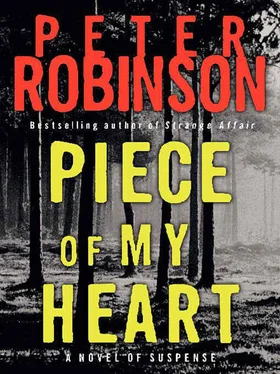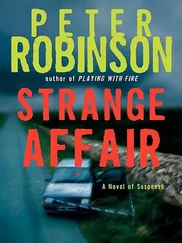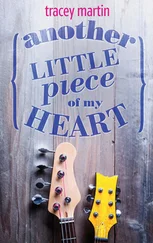Brian grinned. “She is.”
“Is it…?”
“Serious?”
“Well, yes, I suppose that’s what I meant.”
“Too early to say, but I like her enough that I’d hurt if she left me, as the song says.”
“Which song?”
“Ours, idiot. The last single.”
“Ouch. I don’t buy singles.”
“I know that, Dad. I was teasing. And it wasn’t even for sale on a CD. You had to download it from iTunes.”
“Hey, wait a minute. I know how to do that now. I’ve got an iPod. I’m not a complete Luddite, you know.”
Brian laughed and grabbed a can of lager from the fridge. Banks refilled his glass and the two of them went into the entertainment room.
The DVD started with manager Chris Adams giving a potted history, then segued into a documentary made up of old concert footage and interviews. Banks found it amusing and interesting to see the band members of thirty-five years ago in their bell-bottoms and floppy hats manage to sound pretentious and innocent at the same time as they spoke about “peace and love, man.” Vic Greaves, looking wasted as usual in a 1968 interview, went off at a tangent punctuated with long pauses every time the interviewer asked him a question about his songs. There was something icily detached and slightly more cynical about Robin Merchant, and his cool, practical intelligence often provided a welcome antidote to the vapid and meandering musings of the others.
But it was the concert footage that proved most interesting. There was nothing from Brimleigh, unfortunately, except a few stills of the band relaxing with joints backstage, but there were some excellent late-sixties films of the band performing at such diverse places as the Refectory at Leeds University, Bristol’s Colston Hall and the Paradiso in Amsterdam. At one of the gigs, an outrageously stoned and enthusiastic MC yelled in a thick cockney accent, “And now, ladies and gentlemen, let’s ’ave a ’uge ’and for the ’ATTERS!”
The music sounded wonderfully fresh, and Vic Greaves’s innocent pastoral lyrics had a haunting and timeless sadness about them, meshing with his delicate, spacey keyboards work and Terry Watson’s subtle riffs. Like many bass players, Robin Merchant just stood and played expressionlessly, but well, and like many drummers, Adrian Pritchard thrashed around at his kit like a maniac. Keith Moon and John Bonham were clearly big influences there.
There was something a bit odd about the lineup, but Banks was only half watching and half talking to Brian, and the next thing he knew, both Vic Greaves and Robin Merchant were gone and the lovely, if rather nervous, Tania Hutchison was making her debut with the band at London’s Royal Festival Hall in early 1972. Banks thought about his meeting with her the other day. She was still a good-looking woman, and he might have fancied his chances, but he thought he had alienated her with his probing questions. That seemed to be the story of his life, alienating women he fancied.
The documentary went on to portray the band’s upward trajectory until their official retirement in 1994, with clips from the few reunion concerts they had performed since then, along with interviews from an older, chain-smoking, short-haired Tania, and a completely bald, bloated and ill-looking Adrian Pritchard. Reg Cooper and Terry Watson must have declined to be interviewed because they appeared only in the concert footage.
When the film came to a sequence about disagreements within the band, Banks noticed Brian tense a little. Since the investigation had taken him farther into the world of rock than he had ever been before, he had thought a lot about Brian and the life he was living. Not just drugs, but all the trappings and problems that fame brought with it. He thought of the great stars who had destroyed themselves at an early age through self-indulgence or despair: Kurt Cobain, Jimi Hendrix, Tim Buckley, Janis Joplin, Nick Drake, Ian Curtis, Jim Morrison… the list went on. Brian seemed all right, but he was hardly likely to tell his father if he had a drug problem, for example.
“Anything wrong?” Banks asked.
“Wrong? No. Why? What could be wrong?”
“I don’t know. It’s just that you haven’t talked about the band much.”
“That’s because there’s not much to say.”
“So things are going fine?”
Brian paused. “Well…”
“What is it?”
He turned to face Banks, who turned down the DVD volume a notch or two. “Denny’s getting weird, that’s all. If it gets much worse, we might have to get rid of him.”
Denny, Banks knew, was the band’s other guitarist/vocalist, and Brian’s songwriting partner.
“Get rid of him?”
“I don’t mean kill him. Honestly, Dad, sometimes I wonder about the effect your job has on you.”
So do I, Banks thought. But he also thought about killing off disruptive band members – Robin Merchant, for example – and how easy it would have been, just a gentle nudge in the direction of the swimming pool. Vic Greaves had been disruptive, too, but he had made his own voluntary exit. “Weird? How?” he asked.
“Ego, mostly. I mean he’s getting into really off-the-wall musical influences, like acid Celtic punk, and he’s trying to import it into our sound. If you challenge him on it, he gets all huffy and goes on about how it’s his band, how he brought us together and all that shit.”
“What do the others have to say about him?”
“Everybody’s sort of retreated into their own worlds. We’re not communicating very well. We’re going through the motions. There’s no talking to Denny. We can’t write together anymore.”
“What happens if he goes?”
Brian gestured toward the video. “We get someone else. But we’re not going pop.”
“You’re doing just fine as you are, aren’t you?”
“We are. I know. We’re selling more and more. People love our sound. It’s got an edge, but it’s accessible, you know. That’s the problem. Denny wants to change it, and thinks he’s got a right to do so.”
“What about your manager?”
“Geoff? Denny keeps sucking up to him.”
Banks immediately thought of Kev Templeton. “And how is Geoff dealing with that?”
Brian scratched his chin. “Come to think of it,” he said, “he’s getting sick of it. I think at first he liked it that someone in the band was giving him a lot of attention, not to mention telling tales out of school, but I don’t know if you’ve ever noticed this, it’s a weird thing, but eventually people get fed up with their toadies.”
From the mouths of babes, Banks thought, as a lightbulb went on in his brain. Though Brian was hardly a baby. It was as he had suspected. Templeton was digging his own grave. Nobody needed to do anything. Sometimes the best thing to do is nothing. Annie ought to appreciate that, too, Banks, thought, with her interests in Taoism and Zen. “Have drugs got anything to do with it?” he asked.
Brian looked at him. “Drugs? No. If you mean have I ever done any drugs, then the answer’s yes. I’ve smoked dope and taken E. I took speed once, but when I came down I was depressed for a week, so I’ve never touched it since. Nothing stronger. And as it happens, I still prefer lager. Okay?”
“Okay,” said Banks. “It’s good of you to be so frank, but I was thinking more about the others.”
Brian smiled. “Now I see how you trick confessions out of people. Anyway, the answer’s still no. Believe it or not, we’re a pretty straight band.”
“So what next?” Banks asked.
Brian shrugged. “Dunno. Geoff said we all needed to take a breather, we’d been working so hard in the studio and on tour. When we get back… we’ll see. Either Denny will have changed his ideas or he won’t.”
Читать дальше












